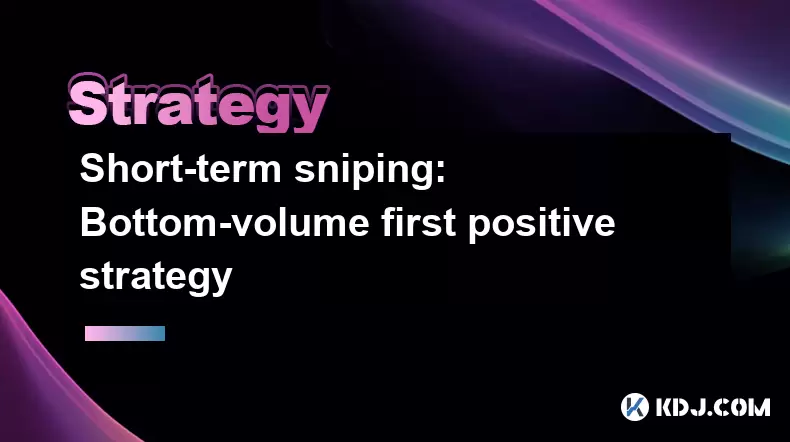-
 bitcoin
bitcoin $87959.907984 USD
1.34% -
 ethereum
ethereum $2920.497338 USD
3.04% -
 tether
tether $0.999775 USD
0.00% -
 xrp
xrp $2.237324 USD
8.12% -
 bnb
bnb $860.243768 USD
0.90% -
 solana
solana $138.089498 USD
5.43% -
 usd-coin
usd-coin $0.999807 USD
0.01% -
 tron
tron $0.272801 USD
-1.53% -
 dogecoin
dogecoin $0.150904 USD
2.96% -
 cardano
cardano $0.421635 USD
1.97% -
 hyperliquid
hyperliquid $32.152445 USD
2.23% -
 bitcoin-cash
bitcoin-cash $533.301069 USD
-1.94% -
 chainlink
chainlink $12.953417 USD
2.68% -
 unus-sed-leo
unus-sed-leo $9.535951 USD
0.73% -
 zcash
zcash $521.483386 USD
-2.87%
Short-term sniping: Bottom-volume first positive strategy
The Bottom-volume first positive strategy in crypto trading involves buying at low volume points and selling at the first sign of positive price movement.
Jun 04, 2025 at 05:15 pm

Short-term sniping: Bottom-volume first positive strategy
In the realm of cryptocurrency trading, short-term sniping strategies can be highly effective for traders looking to capitalize on quick market movements. One such strategy that has gained popularity among crypto traders is the Bottom-volume first positive strategy. This approach focuses on identifying cryptocurrencies that have hit a low volume bottom and are showing the first signs of positive movement. By understanding and implementing this strategy, traders can potentially enhance their short-term trading performance.
Understanding the Bottom-volume First Positive Strategy
The Bottom-volume first positive strategy revolves around the principle of buying cryptocurrencies at their lowest volume points and then selling them when they exhibit their first signs of positive price movement. This strategy is predicated on the belief that low volume periods often precede significant price movements, and by acting quickly, traders can take advantage of these initial upward trends.
To effectively implement this strategy, traders need to closely monitor the volume of the cryptocurrencies they are interested in. Volume is a critical indicator that reflects the overall interest and activity in a particular cryptocurrency. When the volume drops to a low level, it can signal that the market is at a bottom, and a potential reversal may be imminent.
Identifying Low Volume Bottoms
Identifying a low volume bottom is the first step in executing the Bottom-volume first positive strategy. Traders should use charting tools and volume indicators to pinpoint when the volume of a cryptocurrency has reached a significantly low level. This can be done by:
- Monitoring Volume Charts: Use trading platforms that provide real-time volume data. Look for periods where the volume is consistently low compared to the average volume over the past few days or weeks.
- Setting Volume Alerts: Many trading platforms allow users to set alerts for specific volume thresholds. By setting an alert for when the volume drops below a certain level, traders can be notified immediately when a potential low volume bottom is reached.
- Analyzing Historical Data: Review historical volume data to understand the typical volume patterns of the cryptocurrency. This can help in distinguishing between normal low volume periods and those that signify a potential bottom.
Detecting the First Positive Movement
Once a low volume bottom has been identified, the next step is to watch for the first positive movement in the price of the cryptocurrency. This can be detected through various technical indicators and price action signals, including:
- Price Breakouts: Look for the price to break above recent resistance levels. This can indicate that the market is starting to move in a positive direction.
- Candlestick Patterns: Positive candlestick patterns, such as bullish engulfing or hammer patterns, can signal the beginning of an upward trend.
- Moving Averages: If the price crosses above a key moving average, such as the 50-day or 200-day moving average, it may be an early sign of positive momentum.
Executing the Trade
Executing the trade based on the Bottom-volume first positive strategy requires quick action and precise timing. Here are the steps to follow:
- Place a Buy Order: As soon as the first positive movement is detected, place a buy order for the cryptocurrency. It's important to act quickly to capitalize on the initial upward momentum.
- Set a Stop-Loss Order: To manage risk, set a stop-loss order just below the recent low. This will help limit potential losses if the market reverses.
- Monitor the Trade: Keep a close eye on the trade and be prepared to sell as soon as the price shows signs of stabilizing or reversing. The goal is to capture the initial upward movement and exit the trade before any significant downturn.
Risk Management in Short-term Sniping
While the Bottom-volume first positive strategy can be lucrative, it also comes with inherent risks. Effective risk management is crucial for long-term success in short-term sniping. Here are some key risk management techniques to consider:
- Position Sizing: Only allocate a small percentage of your total trading capital to each trade. This helps to minimize the impact of any single loss on your overall portfolio.
- Diversification: Spread your trades across different cryptocurrencies to reduce the risk associated with any one asset.
- Regular Review: Continuously review your trades and adjust your strategy based on performance and market conditions. This can help in refining your approach and improving your results over time.
Tools and Resources for Implementing the Strategy
To effectively implement the Bottom-volume first positive strategy, traders can leverage various tools and resources. Some of the most useful include:
- Trading Platforms: Choose a trading platform that offers advanced charting capabilities and real-time volume data. Platforms like Binance, Coinbase Pro, and Kraken are popular choices among crypto traders.
- Technical Analysis Software: Use software that provides detailed technical analysis tools, such as TradingView or MetaTrader. These platforms can help in identifying low volume bottoms and detecting the first positive movements.
- Crypto News and Analysis Websites: Stay informed about the latest developments in the cryptocurrency market. Websites like CoinDesk, CryptoSlate, and Cointelegraph can provide valuable insights that may influence your trading decisions.
Frequently Asked Questions
Q: How can I determine if a low volume period is a true bottom rather than just a temporary dip?A: Determining whether a low volume period is a true bottom requires careful analysis of both volume and price action. Look for signs of capitulation, such as a significant drop in price followed by a period of low volume. Additionally, consider the overall market sentiment and any relevant news that may impact the cryptocurrency's price. If the low volume period coincides with other indicators of a potential reversal, it may be a true bottom.
Q: What time frames are best suited for the Bottom-volume first positive strategy?A: The Bottom-volume first positive strategy can be applied to various time frames, but it is most effective on shorter time frames such as 15-minute, 30-minute, or 1-hour charts. These shorter time frames allow traders to quickly identify low volume bottoms and capitalize on the initial positive movements.
Q: Can this strategy be used for all types of cryptocurrencies, or are there specific types that work better?A: While the Bottom-volume first positive strategy can be applied to any cryptocurrency, it tends to work best with more liquid assets that have higher trading volumes. Cryptocurrencies with lower liquidity may experience more erratic price movements, making it challenging to accurately identify low volume bottoms and first positive movements.
Q: How do I handle false positives when using this strategy?A: False positives, where a cryptocurrency shows initial signs of positive movement but then reverses, are a common challenge in short-term sniping. To handle false positives, always use a stop-loss order to limit potential losses. Additionally, consider using multiple technical indicators to confirm the first positive movement before entering a trade. If a false positive occurs, review the trade to understand what went wrong and adjust your strategy accordingly.
Disclaimer:info@kdj.com
The information provided is not trading advice. kdj.com does not assume any responsibility for any investments made based on the information provided in this article. Cryptocurrencies are highly volatile and it is highly recommended that you invest with caution after thorough research!
If you believe that the content used on this website infringes your copyright, please contact us immediately (info@kdj.com) and we will delete it promptly.
- Wall Street Whales, DeFi Dynamos, and the Cross-Asset Surge: Decoding BTC, ETH, and Hyperliquid's Latest Plays
- 2026-02-01 13:00:02
- The Big Apple's Crypto Crunch: Dogecoin, Rugpulls, and the Elusive Opportunity
- 2026-02-01 12:55:01
- Bitcoin Tumbles: Trump's Fed Pick and Geopolitical Jitters Spark Price Drop
- 2026-02-01 12:45:01
- Bitcoin's Rocky Road: Inflation Surges, Rate Cut Hopes Fade, and the Digital Gold Debate Heats Up
- 2026-02-01 09:40:02
- Ethereum Navigates Bull Trap Fears and Breakout Hopes Amidst Volatile Market
- 2026-02-01 12:55:01
- Bitcoin Shows Cheaper Data Signals, Analysts Eyeing Gold Rotation
- 2026-02-01 07:40:02
Related knowledge

How to Develop a Crypto Exit Strategy to Secure Your Profits?
Jan 22,2026 at 10:19am
Understanding Market Cycles and Timing1. Cryptocurrency markets operate in distinct phases: accumulation, markup, distribution, and markdown. Recogniz...

How to Find and Invest in Promising DePIN Crypto Projects?
Jan 19,2026 at 06:19pm
Understanding DePIN Fundamentals1. DePIN stands for Decentralized Physical Infrastructure Networks, combining real-world hardware deployment with bloc...

How to Find Liquidity Pools with the Lowest Impermanent Loss Risk?
Jan 25,2026 at 05:59pm
Fundamental Characteristics of Low-Risk Liquidity Pools1. Stablecoin pairs dominate the lowest impermanent loss environments due to minimal price dive...

How to Analyze Market Sentiment Using the Crypto Fear & Greed Index?
Jan 24,2026 at 09:39am
Understanding the Crypto Fear & Greed Index1. The Crypto Fear & Greed Index is a composite metric that aggregates data from multiple sources including...

How to Hedge Your Crypto Portfolio Against a Market Crash?
Jan 19,2026 at 03:40pm
Risk Assessment and Portfolio Allocation1. Determine the total exposure to high-volatility assets such as memecoins or newly launched tokens without a...

How to Use Technical Analysis for Short-Term Bitcoin Trades?
Jan 25,2026 at 01:00pm
Understanding Candlestick Patterns1. Bullish engulfing formations often appear after a sustained downtrend and signal potential reversal points where ...

How to Develop a Crypto Exit Strategy to Secure Your Profits?
Jan 22,2026 at 10:19am
Understanding Market Cycles and Timing1. Cryptocurrency markets operate in distinct phases: accumulation, markup, distribution, and markdown. Recogniz...

How to Find and Invest in Promising DePIN Crypto Projects?
Jan 19,2026 at 06:19pm
Understanding DePIN Fundamentals1. DePIN stands for Decentralized Physical Infrastructure Networks, combining real-world hardware deployment with bloc...

How to Find Liquidity Pools with the Lowest Impermanent Loss Risk?
Jan 25,2026 at 05:59pm
Fundamental Characteristics of Low-Risk Liquidity Pools1. Stablecoin pairs dominate the lowest impermanent loss environments due to minimal price dive...

How to Analyze Market Sentiment Using the Crypto Fear & Greed Index?
Jan 24,2026 at 09:39am
Understanding the Crypto Fear & Greed Index1. The Crypto Fear & Greed Index is a composite metric that aggregates data from multiple sources including...

How to Hedge Your Crypto Portfolio Against a Market Crash?
Jan 19,2026 at 03:40pm
Risk Assessment and Portfolio Allocation1. Determine the total exposure to high-volatility assets such as memecoins or newly launched tokens without a...

How to Use Technical Analysis for Short-Term Bitcoin Trades?
Jan 25,2026 at 01:00pm
Understanding Candlestick Patterns1. Bullish engulfing formations often appear after a sustained downtrend and signal potential reversal points where ...
See all articles
























![[Audio stories] Streamer Became a Billionaire Overnight After Buying One Junk Coin [Audio stories] Streamer Became a Billionaire Overnight After Buying One Junk Coin](/uploads/2026/02/01/cryptocurrencies-news/videos/origin_697eaa9a495ed_image_500_375.webp)

















































